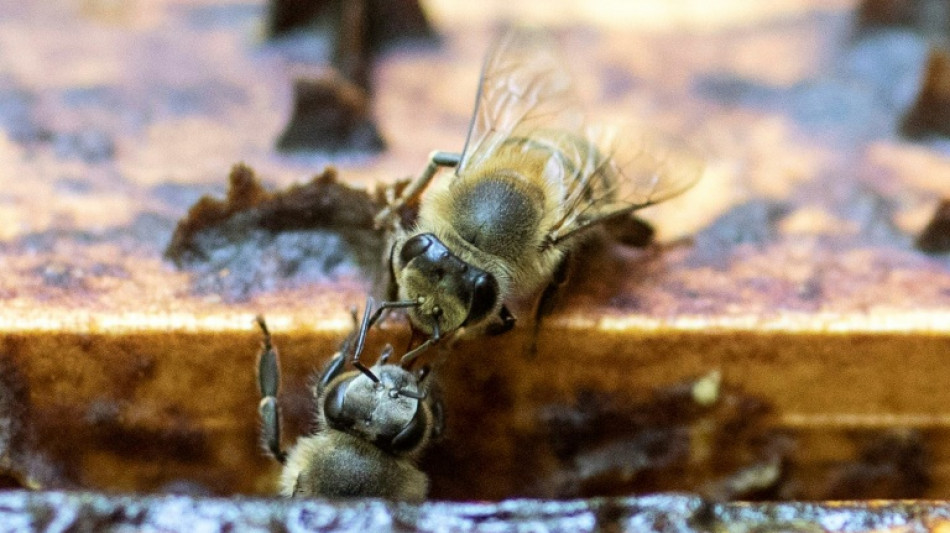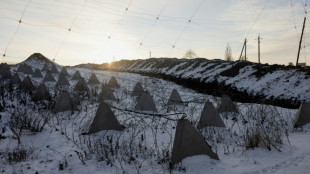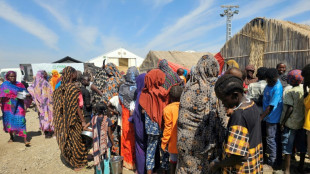
-
 McIlroy shares Riviera clubhouse lead as Rai charges, Scheffler fades
McIlroy shares Riviera clubhouse lead as Rai charges, Scheffler fades
-
Philippines' Duterte earned global infamy, praise at home

-
 Stocks drop, oil rises after Trump Iran threat
Stocks drop, oil rises after Trump Iran threat
-
As European heads roll from Epstein links, US fallout muted

-
 Families of Duterte's drug war victims eye Hague hearing hopefully
Families of Duterte's drug war victims eye Hague hearing hopefully
-
Russian decision is a betrayal: Ukrainian Paralympics chief

-
 Venezuela parliament unanimously approves amnesty law
Venezuela parliament unanimously approves amnesty law
-
Martinez missing as Inter limp to Lecce after Bodo/Glimt humbling

-
 India chases 'DeepSeek moment' with homegrown AI models
India chases 'DeepSeek moment' with homegrown AI models
-
World leaders to declare shared stance on AI at India summit

-
 'Everything was removed': Gambians share pain with FGM ban in balance
'Everything was removed': Gambians share pain with FGM ban in balance
-
Kim Jong Un opens rare party congress in North Korea

-
 Ex-Philippine leader Duterte faces pre-trial ICC hearing
Ex-Philippine leader Duterte faces pre-trial ICC hearing
-
Japanese star Sakamoto 'frustrated' at missing Olympic skating gold

-
 Japan inflation eases in welcome news for Takaichi
Japan inflation eases in welcome news for Takaichi
-
FIFA to lead $75m Palestinian soccer rebuilding fund

-
 Chicago Bears take key step in proposed Indiana stadium move
Chicago Bears take key step in proposed Indiana stadium move
-
Liu captures Olympic figure skating gold as US seal hockey glory

-
 North Korea opens key party congress
North Korea opens key party congress
-
Los Angeles sues Roblox over child exploitation claim

-
 Golden Liu puts US women back on top of Olympic women's figure skating
Golden Liu puts US women back on top of Olympic women's figure skating
-
Hodgkinson sets women's 800m world indoor record

-
 USA's Alysa Liu wins Olympic women's figure skating gold
USA's Alysa Liu wins Olympic women's figure skating gold
-
Man Utd cruise into Women's Champions League quarters

-
 Gu reaches Olympic halfpipe final after horror crash mars qualifiers
Gu reaches Olympic halfpipe final after horror crash mars qualifiers
-
Keller overtime strike gives USA Olympic women's ice hockey gold

-
 NASA delivers harsh assessment of botched Boeing Starliner test flight
NASA delivers harsh assessment of botched Boeing Starliner test flight
-
US Fed Governor Miran scales back call for rate cuts this year

-
 Gu qualifies for Olympic halfpipe final marred by horror crash
Gu qualifies for Olympic halfpipe final marred by horror crash
-
Trump issues Iran with ultimatum as US ramps up military presence

-
 Peru's brand-new president under fire for child sex comments
Peru's brand-new president under fire for child sex comments
-
UK police hold ex-prince Andrew for hours in unprecedented blow

-
 Former Olympic freeski halfpipe champion Sharpe crashes heavily
Former Olympic freeski halfpipe champion Sharpe crashes heavily
-
Former Olympic champion Sharpe suffers heavy halfpipe crash

-
 Belarus says US failed to issue visas for 'Board of Peace' meeting
Belarus says US failed to issue visas for 'Board of Peace' meeting
-
Forest boss Pereira makes perfect start with Fenerbahce rout in Europa play-offs

-
 Alcaraz fights back to book last four berth in Qatar
Alcaraz fights back to book last four berth in Qatar
-
England captain Itoje warns of 'corrosive' social media after abuse of Ireland's Edogbo

-
 War-weary Sudanese celebrate as Ramadan returns to Khartoum
War-weary Sudanese celebrate as Ramadan returns to Khartoum
-
Townsend expects recalled Scotland duo to shine in Six Nations clash with Wales

-
 Peru's new president under fire for child sex comments
Peru's new president under fire for child sex comments
-
UK king opens London fashion week despite brother's arrest

-
 Belarus frees opposition politician Statkevich
Belarus frees opposition politician Statkevich
-
Striking Argentine workers slow down Buenos Aires in protest over labor reforms

-
 Starlink loss a blow to Russian forces in Ukraine: experts
Starlink loss a blow to Russian forces in Ukraine: experts
-
UN's Sudan probe finds 'hallmarks of genocide' in El-Fasher

-
 Belarus frees opposition politician Statkevich: wife
Belarus frees opposition politician Statkevich: wife
-
Rocket re-entry pollution measured in atmosphere for first time

-
 Airbus ready to build two new European fighters if countries want
Airbus ready to build two new European fighters if countries want
-
Canada makes push to attract skilled migrants, including for defence


Rwanda bees being wiped out by pesticides
The use of pesticides in East Africa, some sold by European firms despite being banned in the EU, is killing off bees in large numbers and threatening whole eco-systems, scientists say.
Joseph Ruzigana, of Muhanga district in southern Rwanda, woke up one morning to find all the bees in his 20 newly constructed beehives had died.
"Fellow beekeepers have also lost plenty of bees to these dangerous pesticides. It looks like we won't get any honey this season," he told AFP.
Ruzigana said many beekeepers, who number more than 100,000 in Rwanda according to officials, were giving up.
"The few bees left are very weak and unproductive... I used to get up to 25 kilogrammes (55 pounds) of honey from one beehive in a month-long season, my family was well taken care of, but all that has collapsed," he said.
Changing climate conditions are part of the problem: longer rains this season were not favourable to beekeeping.
But the main issue is pesticides, say locals and experts.
Bees pollinate crops including coffee, tea, avocados, mangoes, beans and tomatoes -- making them key to an agricultural sector that accounts for 30 percent of GDP and 70 percent of employment in Rwanda.
It is the same across the region. Uganda, Ethiopia, Tanzania and Kenya have all reported increasing bee mortality rates due to pesticides, according to the International Centre of Insect Physiology and Ecology in Nairobi.
- Hazardous pesticides -
Rwanda is a poor and landlocked country striving to feed its people through improved maize and rice cultivation, and pesticides help control pests like armyworms.
But many pesticides affect bees' navigation and reproduction, and have been linked to colony collapse disorder, when worker bees abandon a hive.
Rwanda grows large amounts of pyrethrum, a flower that could be used to make a natural pesticide, but exports all its pyrethrum liquid.
Instead, Rwandan farmers use imported synthetic pesticides. A 2022 study by Turkey's Ondokuz Mayis University found that 72 percent used Rocket, containing profenofos, which is highly toxic to bees.
Jeanne Nyirandahimana, part of a women's beekeeping cooperative, said average earnings have fallen from around 250,000 Rwandan francs ($178) per season to around 30,000 ($21).
"It is pesticides like Rocket killing our bees, every day we find many bees dead on roofs and some die in beehives," she said.
An earlier study by the University of Rwanda found that 22 percent of farmers around Lake Kivu used malathion, also deadly to bees.
Despite being banned for use in the EU, malathion is still exported by Denmark, France and Germany -- 12.5 tonnes in 2023, according to the European Chemicals Agency.
- 'Critical importance' -
Jean Claude Izamuhaye, head of crop production at the Rwanda Agricultural Board, said the body was working on the problem.
"They are our natural pollinators, and it is of critical importance that bees are saved," he said, adding that the board was looking into increasing the use of less harmful "bio-pesticides".
The continued sale of toxic pesticides by EU companies can also mean they end up in the food that is sold back to Europe.
A study released this month by Foodwatch, an advocacy group, found that more than half the food imported into the EU from Rwanda contained traces of "highly hazardous" pesticides that are banned in Europe.
EU countries sold 81,615 tonnes of 41 banned pesticides to other countries for agricultural use in 2022, according to the Pesticide Action Network.
Ch.Havering--AMWN



